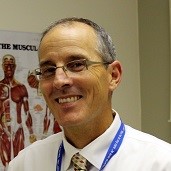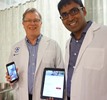
|
Virtual care with remote monitoring catches drug errors and reduces patient pain
November 4, 2021
-
The use of take-home technology by patients following non-elective surgery resulted in significantly greater detection and correction of drug errors, and reduced pain, according to a study published in The BMJ.
|

|
Small study shows promising results with app for concussion recovery
June 28, 2021
-
New research led by Drs. Shawn Marshall and Deanna Quon suggests that an interactive health coaching app may be able to help people recover from a concussion.
|

|
App could provide new way to track vaccine safety
November 17, 2020
-
Vaccines are one of society’s greatest success stories, but like any treatment, there can be rare adverse events and they must be tested carefully. With a massive COVID-19 vaccination campaign on the horizon, Canadian researchers have launched a pilo
|
|
Show more news stories
|

|
Taking CANImmunize to the next level
October 1, 2019
-
CANImmunize, an award-winning vaccine-tracking platform developed by researchers at The Ottawa Hospital, is transitioning into a startup company. The popular app-based platform will continue to digitally transform the delivery of immunization service
|

|
First step towards a database linking rare diseases with treatment options
April 24, 2019
-
Dr. Hanns Lochmüller and collaborators have made the first step towards a “treatabolome” – a database that links treatable rare diseases to treatment options.
|

|
Researcher brings made-in-Ottawa approach to Parkinson’s care to Europe
March 15, 2019
-
A personalized approach for Parkinson’s care pioneered in Ottawa will soon be tested in Europe, thanks to a prestigious $2.2 M grant. This approach, called the Integrated Parkinson’s Care Network, was developed by Drs. Tiago Mestre and David Grimes.
|

|
Provincial innovation award for a computer tablet that could help stroke patients recover
January 9, 2019
-
Dr. Dar Dowlatshahi has been honored with the 2018 e-Health, Technology, and Monitoring Excellence Award by the Innovation Fund Provincial Oversight Committee. His team’s project “Recover Now: Mobile Tablet-based Stroke Rehabilitation in the Acute Ca
|

|
Immunization tracking brought into the digital age
November 30, 2018
-
Building on successful public health reporting pilot projects in Ottawa and Kingston, Ontarians will soon be able to use CANImmunize to immediately see and download their own, and their families’ official immunization records held by the province. CA
|

|
Can a calculator predict your risk of heart attack and stroke?
July 23, 2018
-
Canadian researchers have built and validated an online calculator that empowers individuals to predict their risk of cardiovascular disease. Their process was published today in the journal CMAJ, and the calculator is available at projectbiglife.com
|

|
Research project aims to improve end-of-life care in the community
May 25, 2018
-
Most people prefer to spend their last days of life at home surrounded by family and loved ones. For many, having the support they need starts with a discussion about what to expect. This often doesn’t happen.
Part of the challenge is talking abou
|

|
The Ottawa Hospital opens digital health lab at Algonquin College
April 18, 2018
-
April 18, 2018 (OTTAWA) — Algonquin College and The Ottawa Hospital are expanding their collaboration on health research, innovation and training with the opening of “The Ottawa Hospital at Algonquin College”. The newly renovated space – located wi
|

|
Does this ankle need an X-ray? There’s an app for that
May 9, 2016
-
An app based on internationally-known Ottawa Rules will save patients from unnecessary scans
The Ottawa Rules, a set of rules used around the world to help health professionals decide when to order x-rays and CT scans, are now available as a
|
_100.jpg)
|
Can smartphone-assisted therapy help prevent suicide? Researchers get $1.7M grant to find out
January 27, 2016
-
Every year about 1,200 people in Ottawa arrive at a hospital with self-harm, usually from an overdose of pills. About five percent of these people will die by suicide in the next five years. However, the treatment given to this high-risk group is
|
